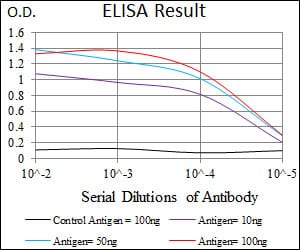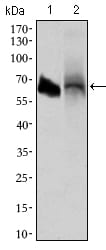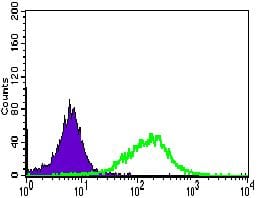


| WB | 1/500 - 1/2000 | Human,Mouse,Rat |
| IF | 咨询技术 | Human,Mouse,Rat |
| IHC | 咨询技术 | Human,Mouse,Rat |
| ICC | 技术咨询 | Human,Mouse,Rat |
| FCM | 1/200 - 1/400 | Human,Mouse,Rat |
| Elisa | 1/10000 | Human,Mouse,Rat |
| Aliases | IAP |
| Entrez GeneID | 248 |
| clone | 3B10E7 |
| WB Predicted band size | 56.8kDa |
| Host/Isotype | Mouse IgG1 |
| Antibody Type | Primary antibody |
| Storage | Store at 4°C short term. Aliquot and store at -20°C long term. Avoid freeze/thaw cycles. |
| Species Reactivity | Human |
| Immunogen | Purified recombinant fragment of human ALPI (AA: 397-458) expressed in E. Coli. |
| Formulation | Purified antibody in PBS with 0.05% sodium azide |
+ +
以下是关于ALPI(肠道碱性磷酸酶)抗体的3篇参考文献的简要总结,涵盖其在疾病机制、检测方法及治疗应用中的研究:
---
1. **文献名称**:*Intestinal alkaline phosphatase prevents metabolic syndrome in mice*
**作者**:Bilski J, et al.
**摘要**:本研究通过免疫组化和Western blot分析,利用特异性ALPI抗体证实了肠道碱性磷酸酶在抑制小鼠代谢综合征(如肥胖和胰岛素抵抗)中的作用。结果显示,ALPI通过调节肠道菌群和炎症通路发挥保护效应。
2. **文献名称**:*Role of intestinal alkaline phosphatase in innate immunity*
**作者**:Kaliannan K, et al.
**摘要**:作者通过ALPI抗体介导的蛋白定位和功能抑制实验,揭示了ALPI在肠道先天免疫中的关键角色。研究发现,ALPI通过降解细菌脂多糖(LPS)减轻全身炎症反应,并维持肠道屏障完整性。
3. **文献名称**:*Development of a monoclonal antibody-based ELISA for quantification of intestinal alkaline phosphatase*
**作者**:Tuin A, et al.
**摘要**:该文献报道了一种基于ALPI单克隆抗体的新型ELISA检测方法,用于定量血清和粪便中的ALPI水平。该方法灵敏度高、特异性强,为临床诊断肠道炎症性疾病提供了可靠工具。
---
以上文献展示了ALPI抗体在基础研究、疾病机制解析及诊断技术开发中的多样化应用。如需具体文献来源或更多细节,建议通过PubMed或Web of Science进一步检索。
ALPI (alkaline phosphatase, intestinal) antibodies target the intestinal isoform of alkaline phosphatase, an enzyme critical for maintaining gut homeostasis and modulating inflammatory responses. Primarily expressed in the small intestine, ALPI plays a key role in detoxifying bacterial lipopolysaccharides (LPS) by dephosphorylating them, thereby reducing systemic inflammation and protecting intestinal barrier integrity. Dysregulation of ALPI activity has been implicated in inflammatory bowel diseases (IBD), such as Crohn’s disease and ulcerative colitis, as well as metabolic disorders like obesity and diabetes.
Research on ALPI antibodies has focused on their diagnostic and therapeutic potential. In autoimmune or inflammatory conditions, anti-ALPI autoantibodies may serve as biomarkers to assess disease progression or mucosal damage. Conversely, therapeutic strategies using exogenous ALPI or monoclonal antibodies to modulate its activity are being explored. For instance, recombinant ALPI has shown promise in preclinical models for mitigating sepsis and colitis by neutralizing LPS. However, the precise mechanisms linking ALPI dysfunction to specific pathologies remain under investigation, particularly its interplay with gut microbiota and immune signaling pathways. Current challenges include optimizing antibody specificity and delivery methods for clinical applications. ALPI-targeted therapies represent a growing area of interest in gastroenterology and immunology, bridging microbial interactions and host immunity.
×